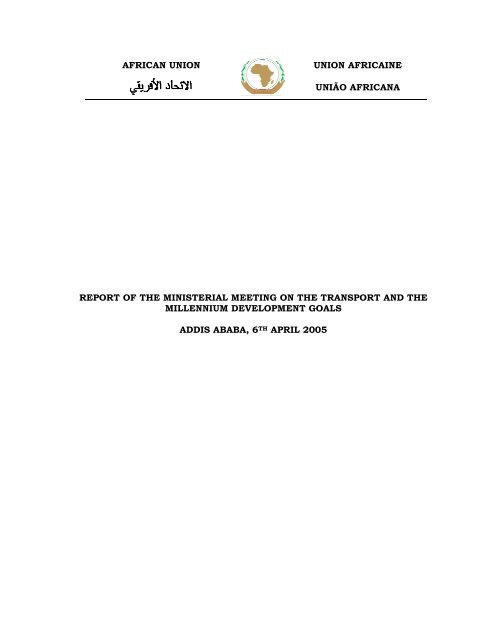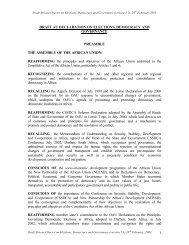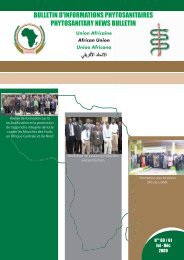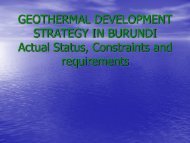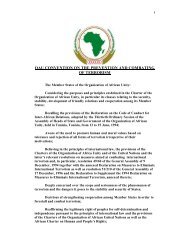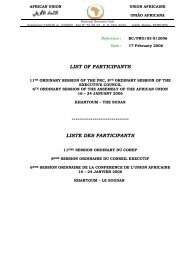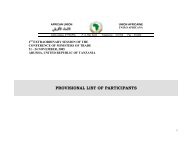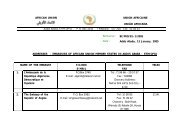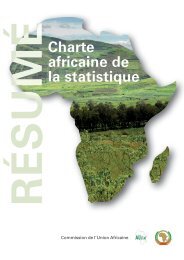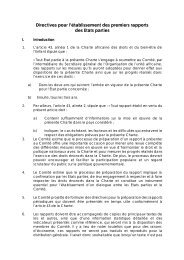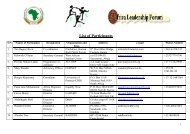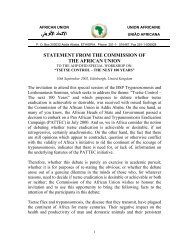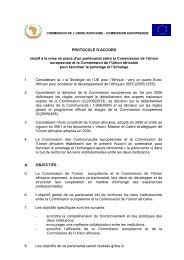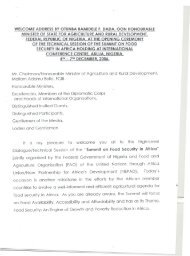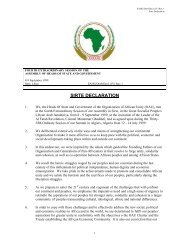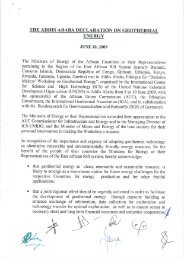AFRICAN UNION UNION AFRICAINE UNIÃO AFRICANA REPORT ...
AFRICAN UNION UNION AFRICAINE UNIÃO AFRICANA REPORT ...
AFRICAN UNION UNION AFRICAINE UNIÃO AFRICANA REPORT ...
Create successful ePaper yourself
Turn your PDF publications into a flip-book with our unique Google optimized e-Paper software.
<strong>AFRICAN</strong> <strong>UNION</strong><br />
<strong>UNION</strong> <strong>AFRICAINE</strong><br />
UNIÃO <strong>AFRICAN</strong>A<br />
<strong>REPORT</strong> OF THE MINISTERIAL MEETING ON THE TRANSPORT AND THE<br />
MILLENNIUM DEVELOPMENT GOALS<br />
ADDIS ABABA, 6 TH APRIL 2005
I. INTRODUCTION<br />
1. On the 6 th April 2005, African Ministers responsible for transport and<br />
infrastructure held a meeting on Transport and the Millennium Development<br />
Goals (MDGs) at the Commission of the African Union in Addis Ababa,<br />
Ethiopia. The main objective of the meeting was to consider and adopt<br />
transport targets and indicators considered essential in the achievement of the<br />
MDGs in Africa. The outcome of the Ministers meeting was to be submitted to<br />
the Summit of the African Union in July 2005 and ultimately presented to the<br />
UN Conference on the review of the MDGs.<br />
2. The Ministers were meeting following a two-day preparatory session of<br />
sector experts, which proposed a declaration and matrix of transport targets<br />
and indicators as well as implementation strategies crucial to their attainment,<br />
and, hence, accelerating the achievement of the MDGs. In that context, the<br />
Ministers were expected to make a thorough consideration of the proposed<br />
targets and indicators, adopt them and declare their commitment to their<br />
implementation.<br />
II.<br />
PARTICIPATION<br />
3. The following Member States were represented at the meeting: Algeria,<br />
Angola, Benin, Botswana, Burkina Faso, Burundi, Cameroon, Cape Verde,<br />
Chad, Congo, Côte d’Ivoire, Democratic Republic of Congo, Egypt, Ethiopia,<br />
Gabon, Gambia, Ghana, Guinea, Kenya, Lesotho, Libya, Madagascar, Malawi,<br />
Mali, Mauritania, Mauritius, Mozambique, Namibia, Nigeria, Central African<br />
Republic, Senegal, Sierra Leone, South Africa, Sudan, Swaziland, Tanzania,<br />
Togo, Tunisia, Uganda, Zambia and Zimbabwe.<br />
4. The United Nations Economic Commission for Africa (UNECA), the<br />
African Development Bank (ADB), the European Union (EU), and the World<br />
Bank (SSATP) also participated in their capacity as African Union partners.<br />
The following organisations were also in attendance: The United Nations Office<br />
for the High Representative for the Least Developed Countries, Landlocked<br />
Developing Countries and Small Island Developing States (OHRLLS), United<br />
Nations Fund for Population Activities (UNFPA) and the Union of African<br />
Railways (UAR).<br />
5. The following regional economic communities (RECs) also took part:<br />
CEN-SAD, ECCAS, ECOWAS, COMESA and IGAD.<br />
6. The full list of participants is annexed to this report.<br />
III. OPENING CEREMONY<br />
7. The opening ceremony was conducted by Dr. Bernard ZOBA, the<br />
Commissioner for Infrastructure and Energy of the African Union, who<br />
cordially welcomed the Ministers, heads of delegations, invited guests and<br />
other participants to the meeting. He proceeded to mention the objectives and<br />
expected outcome of the meeting. He then invited the representatives of the<br />
various partner organisations present to address the meeting before the
2<br />
opening speech of Honourable Dr. Kassu Yilala, Minister for Infrastructure of<br />
the Federal Democratic Republic of Ethiopia.<br />
Address by H.E. Mr. Anwarul K. CHOWDHURY, the Under-Secretary-<br />
General and High Representative – UN Office of the High Commission for<br />
the Least Developed Countries, Landlocked Developing Countries and<br />
Small Island Developing States<br />
8. The High Representative began his statement by expressing his gratitude<br />
at the opportunity to address the historic meeting. He underscored the role<br />
that transport can play in combating rural poverty and as a necessary<br />
precondition for attaining the MDGs. He noted the major constraints suffered<br />
by developing landlocked countries arising from excessive transport costs<br />
which create barriers to the foreign markets. He further informed the meeting<br />
that this situation is further aggravated by the inadequate infrastructure<br />
development and other non-physical barriers existing in transit countries.<br />
9. As well, the High Representative informed the Meeting that, in an effort<br />
to address these imbalances, the International Ministerial Conference of<br />
Landlocked and Transit Developing Countries, Donor Countries and<br />
International Financial and Development Institutions held in Almaty,<br />
Kazakhstan in 2003 adopted the Almaty Programme of Action on transit<br />
transport cooperation. This programme, he mentioned, takes a holistic<br />
approach to transport, trade and development and attempts to provide links<br />
between development and effective transport services. In that context, it aims<br />
at the integration of the landlocked developing countries into the world<br />
economy and international trading systems through the establishment of<br />
efficient transit systems and thus overcoming the particular problems caused<br />
by the lack of access to the sea and isolation from global markets.<br />
10. In conclusion, the High Representative stated that this information was<br />
timely and of vital importance to the meeting, considering that half of the<br />
worlds developing landlocked countries are situated in Africa. He, therefore,<br />
underlined the need for a high level meeting to consider relevant indicators on<br />
African transport needs in order to sensitise world leaders on the issue during<br />
the upcoming September UN summit on the Millennium Development Goals.<br />
Address by Mr. Juste RWAMABUGA of the African Development Bank<br />
(ADB)<br />
11. Mr. Rwamabuga of the African Development Bank (ADB) thanked the<br />
African Union for piloting the ongoing process in the transport sector whose<br />
outcome will help highlight the role of transport within the framework of<br />
Millennium Development Goals. The distinguished representative further<br />
underscored the role of ADB as a stakeholder in the mission for achieving the<br />
MDGs and added the fact that in the vision of the ADB on poverty eradication,<br />
the transport sector plays a very crucial role.<br />
12. He also noted that critical funding and implementation issues were<br />
implicit in the attainment of the proposed transport targets and indicators and<br />
need to be seriously addressed. To that end, he recalled the mandate conferred
3<br />
upon the ADB by the African Heads of State within the NEPAD framework by<br />
which the Bank, in collaboration with other partners prepared a short-term<br />
action plan (STAP) and initiated a medium to long-term strategic study with a<br />
view to defining specific strategic actions that need to be undertaken to<br />
implement priority infrastructure programmes in Africa.<br />
Address by Ms. Josephine OUEDRAOGO, Ag. Deputy Executive Secretary<br />
of the Economic Commission for Africa (UNECA)<br />
13. Ms. Josephine Ouedraogo, Ag. Deputy Executive Secretary of the UNECA<br />
began her statement by acknowledging the crucial role of transport in<br />
achieving the MDGs. She further added that the Millennium Declaration<br />
constitutes a strong sign on the part of our partners in support of a just and<br />
equitable world as well as a great endeavour that would bring about<br />
consolidation of global efforts in the eradication of poverty, hunger, gender<br />
disparities, infant and maternal mortality, environmental degradation and<br />
diseases such as malaria and AIDS.<br />
14. She went on to recount various activities including studies undertaken<br />
by the UNECA for the development of transport infrastructure and services<br />
which she likened to an important strategy in combating poverty and, hence,<br />
realisation of the MDGs. She spoke of the insufficient development of transport<br />
infrastructure and services in Africa which has constrained intra-Africa trade<br />
while undermining the competitive edge of Africa’s commodities in world<br />
markets due to high transport costs. As well, lack of means of public transport<br />
has resulted in poor mobility for rural and urban poor particularly women.<br />
15. The Ag. Deputy Executive Secretary cited lessons from the two United<br />
Nations Transport and Communications Decades for Africa (UNTACDA I&II)<br />
referring to particularly the need to strengthen consultations on<br />
implementation of policies and concrete programmes at all levels. She<br />
concluded by underscoring the need to prioritise resource allocation to the<br />
development of transport infrastructure and services as a key strategy in the<br />
MDGs programme. She also expressed appreciation for the meeting being<br />
convened at the very material time in line with the recently elaborated African<br />
Union /NEPAD programme. She, finally, reiterated the commitment of UNECA<br />
to collaborate with all the stakeholders in ensuring the implementation of the<br />
outcome of the meeting.<br />
Address by Mr. John RIVERSON of the World Bank<br />
16. Mr. Riverson underscored the historical importance of the meeting in its<br />
recognition that transport has been acknowledged as a catalyst of achieving<br />
the MDGs as the comprehensive proposals of the meeting that focus<br />
exclusively on transport and its role in alleviating poverty. The representative<br />
urged the meeting to consider establishing stronger institutional frameworks in<br />
order to optimise the role of transport in attaining the MDGs.
Address by Mr. John Bruce THOMPSON of the European Union<br />
4<br />
17. Mr. Thompson who represented the European Union (EU) started his<br />
address by stating the importance that his organisation attached to the<br />
meeting. He further acknowledged that the proposals of the meeting, having<br />
been based on African experience would represent the voice of Africans in the<br />
forthcoming UN Summit on the MDGs. Drawing on the experiences of the EU<br />
in its activities within the OECD forum on poverty reduction for economic<br />
growth the representative informed the meeting that the timing and availability<br />
of resources was of essence in attaining the objectives of the MDGs.<br />
18. He thus advocated for concerted efforts by all development partners<br />
together with the AU and the African Ministers of transport and the Regional<br />
Economic Communities (RECs). He reminded the meeting that the EU was one<br />
of the major donors to the transport sector in sub-Saharan Africa and further<br />
committed that the institution would remain committed and ready to facilitate<br />
the continent in ensuring the success of the MDGs.<br />
19. Finally, Mr. Thompson urged the meeting of the importance of the<br />
removing non-physical barriers to trade and to this end urged the Member<br />
States of the African Union to implement international conventions in this<br />
regard as this would bring immediate economic benefits to the region.<br />
Address by Dr. Bernard ZOBA, Commissioner for Infrastructure and<br />
Energy of the African Union<br />
20. In his address, Dr. ZOBA thanked the various stakeholders including<br />
the UNECA, ADB, the European Union, the Sub-Saharan Transport Policy<br />
(SSATP) programme and the World Bank for their moral and material support<br />
in ensuring successful organisation of the meeting. He especially expressed<br />
deep gratitude to the government of Ethiopia and to the Ethiopian Minister of<br />
Infrastructure for the vital role they played in facilitating the meeting.<br />
21. The Commissioner recalled Decision EX.CL/166(VI) of the Abuja Summit<br />
that requests the Commission to carry out an evaluation of the implementation<br />
of MDGs in Africa with a view to elaborating an African common position on<br />
the MDGs that will be presented to the UN General Assembly in September<br />
2005. In that context, he assured that the role of transport as specified by the<br />
outcome of this meeting would form part of the key recommendations on the<br />
strategies for the achievement of MDGs in the continent.<br />
22. He then went on to inform participants about the core programme of the<br />
African Union in the transport sector, in accordance with the new vision,<br />
mission and strategic framework of the African Union with the key theme of<br />
“Linking Africa”. In the implementation of the continental programme, he<br />
stated that the role of the African Union would basically be provision of<br />
leadership, coordinating, harmonising, facilitating, advocacy and change agent.<br />
In the same light, he underlined the role of the regional economic communities<br />
(RECs) as pillars of the African Union with specialised agencies and partner<br />
organisation providing the requisite support.
5<br />
23. The Commissioner concluded his address by urging the Ministers to play<br />
an active role in ensuring the realisation of the set transport targets and<br />
indicators for the successful accomplishment of the MDGs in Africa.<br />
Opening speech by Hon. Dr. Kassu YILALA, the Minister of Infrastructure<br />
of the Federal Republic of Ethiopia<br />
24. In his opening speech the Minister began by acknowledging the vital role<br />
of the meeting in bringing transport to its rightful place in the implementation<br />
of the MDGs. He further expressed his gratitude to the AU and it’s development<br />
partners, UNECA, SSATP, World Bank, ADB for having taken the initiative in<br />
this process. He further highlighted the role of an efficient cost effective and<br />
accessible transport system to positively impact on millions of people of whom<br />
the greatest number live in Africa.<br />
25. He informed the meeting that his country would draw from the outcomes<br />
of the meeting to enrich its national process of the road map to achieving the<br />
MDGs. Finally the Minister reminded the meeting that transport in Africa had<br />
always been accorded low level attention and urged the meeting to change this<br />
IV. ELECTION OF THE BUREAU<br />
26. The following countries were unanimously elected to the Bureau of the<br />
meeting following due consultations:<br />
• Chairperson Ethiopia<br />
• 1 st Vice Chairperson Gabon<br />
• 2 nd Vice Chairperson Nigeria<br />
• 3 rd Vice Chairperson Swaziland<br />
• Rapporteur Egypt<br />
V. ADOPTION OF THE AGENDA<br />
27. The following Agenda was adopted by the meeting:<br />
I. Opening Ceremony:<br />
1. Welcoming remarks by the Commissioner for Infrastructure and<br />
Energy – African Union<br />
2. Statement of the Under Secretary-General and High Representative –<br />
UN-OHRLLS<br />
3. Statement of the Representative of ADB<br />
4. Statement of the Representative of UNECA<br />
5. Statement of the Representative of the World Bank<br />
6. Statement of the Representative of the European Union<br />
7. Statement by the Commissioner for Infrastructure and Energy of the<br />
African Union<br />
8. Opening Speech by the Minister for Infrastructure of the Federal<br />
Republic of Ethiopia
Working Session<br />
6<br />
1. Election of the Bureau<br />
2. Adoption of the Agenda and Work Programme<br />
3. Consideration of the report of the meeting of experts<br />
4. Adoption of the Ministerial Declaration<br />
5. Any other business<br />
II.<br />
Closure<br />
VI. ORGANISATION OF WORK<br />
28. After an exchange of views, the meeting adopted the following working<br />
hours:<br />
Morning:<br />
Afternoon:<br />
11.00 – 13.00hrs<br />
14.30 – 19.00hrs<br />
VII. EXAMINATION OF THE <strong>REPORT</strong> OF THE EXPERTS ON TRANSPORT<br />
AND THE MDGs<br />
A. Presentation of the Report of the Experts Session of the Ministerial<br />
Meeting on the Transport and Millennium Goals<br />
29. The Chairman of the meeting of experts presented the report of the<br />
experts’ session. In his presentation, he briefed the meeting on the views of the<br />
experts and their proposed amendments to the technical paper. He stated that<br />
while the experts had found the working document to be of high quality, they<br />
had made a number of suggestions to improve and add value to the document.<br />
In particular, the experts underscored the need for an implementation strategy<br />
for the adopted targets and indicators. The highlights of the experts<br />
recommendations included the following:<br />
• There was need for the implementation and financing strategies in the<br />
document covering the following key areas of the programme:<br />
- Institutional strengthening and integration;<br />
- Formulation and implementation of clear and practical strategies and<br />
plans; and<br />
- Ensuring that there is adequate delivery capacity in terms of human<br />
capital, funding, administrative systems and research support.<br />
• There should be an adequate emphasis on multimodal transport in the<br />
programme;<br />
• The need to prioritise targets and indicators in the national programmes<br />
to avoid past mistakes of trying to achieve too much with limited<br />
resources and institutional capacities. The failure to prioritise had<br />
resulted in many projects being attempted at once with very limited<br />
success in all of them.<br />
• The introduction of gender issues in the targets and indicators in order to<br />
address the problems that are particular to women in regard to transport.<br />
• The need to have realistic and measurable targets and indicators.
7<br />
• There was a need for targets and indicators for safety and security in the<br />
maritime and air transport as well as for the prevention of marine<br />
pollution and overall protection of the environment.<br />
• The AU should take clear responsibility for co-ordinating delivery on the<br />
Programme across all regions. The implementation at Member States level<br />
should be coordinated by regional economic communities (RECs), who<br />
should be required to report to the AU regularly on the progress in this<br />
regard.<br />
• The RECs should be mandated to put measures in place through which<br />
member States regularly report on progress and account for slow/poor<br />
delivery, while at the same time ensuring that assistance is provided to<br />
address any challenges that may arise at regional level<br />
• In order to ensure that the targets set towards the achievement of the<br />
eight MDGs in Africa, the Au should adopt a clear implementation<br />
approach. articulating the institutional structure necessary to manage the<br />
implementation, and based on the continental, regional and national level<br />
30. Finally, the Chairman of the experts session informed the meeting that<br />
the suggested changes including the implementation strategy were included in<br />
the report and reflected in the Ministerial Declaration. He therefore requested<br />
the meeting of Ministers to adopt the report.<br />
B. Deliberations on the Report of the Experts Session<br />
31. The meeting commended the experts for their thorough work and high<br />
quality of their report. They then endorsed the report on the understanding<br />
that it would be aligned with the Declaration once adopted as appropriate.<br />
VIII. ADOPTION OF THE MINISTERIAL DECLARATION ON TRANSPORT<br />
AND THE MDGs<br />
32. The Ministers considered the Draft Declarations together with the matrix<br />
of targets and indicators as presented and congratulated the experts for the<br />
quality of the documents. They then made a number of observations,<br />
comments and proposed changes to the Draft Declaration aimed at improving<br />
the form and contents of the document. Their substantive input included the<br />
following:<br />
• It was recommended that the language of the Draft Declaration be in the<br />
form of instruction and, therefore, needed to always begin with “should”.<br />
• In view of the need for closely monitoring of the implementation process,<br />
the African Union should create, as a matter of priority, a specialised<br />
technical committee on transport that would meet regularly to follow up<br />
on the progress of the programme.<br />
• The draft Declaration be amended to reflect the totality of the sector<br />
ministers involved and also the context in which the Meeting was taking<br />
place. Thus, the title has to reflect in full that it was the Ministers of<br />
transport and infrastructure meeting to consider the role of transport in<br />
achieving the Millennium Development Goals.
8<br />
• To emphasise the role of all sectors of the transport infrastructure it was<br />
necessary to specifically mention maritime ports and inland waterways in<br />
the preamble.<br />
• Regarding target number 10 on “leaded petrol”, there was a debate as to<br />
whether transport Ministers had the mandate to recommend on the<br />
cessation of production leaded petrol. Moreover, some delegates felt that<br />
the deadline was too close to be achievable and that it was a very<br />
ambitious target that would be too expensive to implement. After serious<br />
deliberations, it was decided that Africa needed to set high targets in order<br />
to improve on the lives of its citizenry. Furthermore, the meeting was<br />
informed that the target was in line with current international<br />
recommendations on the matter and it was, therefore, necessary to<br />
maintain the respective target and indicator in the Declaration.<br />
• The incidence of aids in Africa had reached epidemic proportions and<br />
while the global target for achieving the MDGs is year 2015, it was felt<br />
that the AIDS issue merited the target date being brought forward to the<br />
year 2010 to underscore the urgency of combating the scourge.<br />
• It was noted that while the Targets and indicators had been suitably<br />
amended to include gender issues, the Draft Declaration was silent on the<br />
issue. This being of great concern to a big number of the African<br />
population it was recommended that the same be reflected and<br />
incorporated in the Declaration.<br />
• There was a need to amend target no.1 to remove ambiguity in the<br />
comparison between Africa and Asia so that it would be well understood<br />
that the achievable target would be measured by transport indicators<br />
within Africa as compared to those within Asia.<br />
• Institutional structures for monitoring the progress be established at the<br />
national level as well.<br />
• The need to improve the regulatory framework of Member State legal<br />
systems in order to improve the private partnership participation was<br />
raised and addressed. It was recommended that the same should form<br />
part of the declaration at target no.12 so that Member States are urged to<br />
address the issue.<br />
• The programme of implementation of the MDGs should be accompanied<br />
by a plan of action. However, after lengthy deliberations it was felt that the<br />
issue would be best addressed at national level.<br />
• There was a need to institutionalise the transport sector meeting into the<br />
African Union structure and further to introduce transport into national<br />
teaching curricula.<br />
• The issue of competency and capacity had not been adequately captured<br />
in the Declaration. In this regard, it was proposed that the need for the<br />
support to training and research be specifically reflected.<br />
• In target 7, the need to reduce accidents fatalities be extended other<br />
modes of transport besides road, i.e. air, railway, maritime and inland<br />
waterways.<br />
• Physical barriers to the flow of trade be added in target no. 12.<br />
• The Declaration should include a requirement for Member States to give<br />
due consideration to the phenomenon of desertification and sand<br />
movement during the formulation of transport policies and programmes.
9<br />
33. Finally, the Declaration was adopted with the suggested amendments<br />
and improvements. The finalised text of the Declaration and the matrix of<br />
targets and indicators are annexed to this report.<br />
IX.<br />
OTHER BUSINESS<br />
34. The Republic of Angola raised the issue of lack of the working<br />
documents in its official language to which the Commissioner for<br />
Infrastructure and Energy expressed profound apologies to all Portuguese<br />
speaking delegates. He promised that the Commission would do its best to<br />
avoid recurrence of such an unsavoury situation.<br />
35. The Commissioner for Infrastructure and Energy took the opportunity to<br />
inform the Ministers and other participants that the African Union in<br />
collaboration with the Government of the Republic of South Africa were<br />
organising a meeting of African Ministers responsible for air transport to be<br />
held in Sun City, South Africa from 16 to 19 May 2005. He cordially invited all<br />
the stakeholders to the meeting and requested that the information be<br />
conveyed to others not present in this meeting. He promised that the relevant<br />
documents including invitation letters, draft agenda, work programme and<br />
concept note of the meeting would be conveyed to participants soon.<br />
VOTE OF THANKS<br />
36. In proposing a vote of thanks, the Honourable Minister of Transport of<br />
South Africa thanked the experts for the preparation of a high quality<br />
document and the international organisations who had provided logistical<br />
support both for the preparation process and the meeting. The Minister further<br />
extended a vote of thanks to the Commissioner of Infrastructure and Energy<br />
for the professional manner in which he had facilitated the meeting. He, finally<br />
expressed gratitude to the Government of the Federal Republic of Ethiopia<br />
through the Minister of Infrastructure for the hospitality extended to all the<br />
delegates.<br />
X. CLOSING<br />
37. The Chairman, Dr. Kassu Yilala, Minister of Infrastructure of the Federal<br />
Republic of Ethiopia, thanked the participants for their positive and effective<br />
participation which enabled the meeting to reach fruitful conclusion. He then<br />
declared the meeting closed.<br />
Annexes:<br />
1. Declaration of the African Ministers Responsible for Transport and<br />
Infrastructure on Transport and the Millennium Development Goals.<br />
2. Table of Transport Targets and Indicators in the Achievement of the<br />
MDGs.<br />
3. List of Participants


